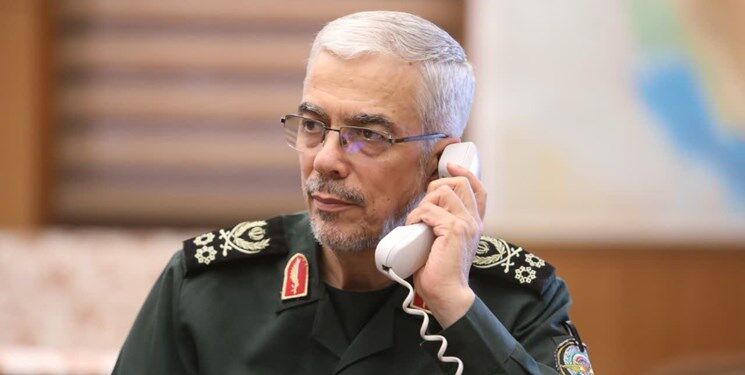
Mohammad Bagheri, chief-of-staff of the Iranian Armed Forces, speaks by phone with Türkiye’s Minister of Defense Yaşar Güler with regard to events in the Gaza Strip, 20 October 2023.
“The main agreement was not their displacement but rather their complete disarmament.”
Kurdish separatist groups in Iran and neighboring countries have been a scourge to Iran for decades.[i] However, over the past two years, the Iranian government has become much more assertive in demanding that Iraqi Kurdish authorities dismantle Iranian Kurdish bases inside Iraqi Kurdistan.[ii] In a series of recent meetings, Iranian officials have demanded that Iraqi and Iraqi Kurdish authorities completely disarm and relocate Iranian Kurdish separatist groups away from the Iranian border. In the excerpted article from the Mehr News Agency, Mohammad Bagheri, an Islamic Revolutionary Guard Corps (IRGC) general who serves as the Iranian military’s chief-of-staff, argues for a complete elimination of Kurdish safe havens inside Iraq. Iraqi and Iraqi Kurdish authorities suggest that Turkey’s establishment of a de facto buffer zone against the Kurdistan Workers’ Party (PKK) along the Iraq-Turkish frontier, combined with Turkey’s frequent bombing of alleged PKK targets in both Iraqi and Iraqi Kurdish territory, motivated Iran to request similar privileges along Iraq’s eastern frontier. It is unclear if Iraq will act on Iran’s demands, but the possible creation of dual Turkish and Iranian buffer zones raises the prospect of the two countries fighting by proxy inside Iraq.
Sources:
“Bagheri: Iraq Bayad Tajziyeh Taliban ra Tabegh Tavafegh ba Iran Haleh Saleh Konad” (Bagheri: Iraq Should Disarm the Separatists According to its Agreement with Iran),” Mehr News Agency (semi-official news agency owned by Iranian government’s Islamic Development Organization), 7 October 2023. https://www.mehrnews.com/news/5904819
[Mohammad] Bagheri [chief-of-staff of the Iranian Armed Forces] continued, “The countries of Southwest Asia, especially the Islamic Republic of Iran, are exceptional and unique due to having strategic and political geography, sitting astride the world’s communication highway and the strategic strait [of Hormuz]. They have rich mineral resources and fossil fuel resources, are home to the great heavenly religions, including the existence of the Qibla [in Mecca] and the shrine of the holy Imams of the Prophet (peace be upon him) and various other factors.”
He emphasized that the rich resources of the West Asian region and the special place of this region have always been coveted by the powers; our region is constantly witnessing foreign interference and discord among nations and governments.
He said, “We see that the enemies are always trying to create differences between countries in the region between ethnicities, tribes and religions and by weakening the legal sovereignty of countries, they constantly engage the region so that they can justify their aggressive presence due to the they create. A clear example of this was the creation of the Islamic State, which even to the leaders of the oppressive American state admitted was created by them….”He said, “The problem of the borders of Iran and our neighbors and the insecurities we have on our borders is an investigative and extremely important issue.” Referring to the movements of terrorists from across the borders of Sistan and Baluchestan [with Pakistan] and the [Iraqi] Kurdistan Region, Bagheri said, “What does it mean for Iranian separatist groups to be based in Iraqi Kurdistan and carry out all kinds of terrorist acts in our country? And we have to keep a lot of forces at the border. Iraqi officials also confirm that this issue must be resolved definitively. Last month, an agreement was reached between the secretary of the Supreme National Security Council of Iran and the national security advisor of Iraq to complete disarmament within six months. In recent weeks, the Iraqi government and all the dear officials who are trying there have made some efforts. They have moved these groups from bases near our border, The main agreement was not their displacement of separatist forces but rather their complete disarmament.
Notes:
[i] Iranian Kurdish insurgency predates Iran’s 1979 Islamic Revolution. Kurdish tribal revolts spanned the Ottoman-Persian frontier in the late 19th century. In the wake of both World War I and World War II, Iranian Kurds sought to assert local autonomy to fill the vacuum left by weak central government. This culminated in the 1946 establishment of the Mahabad Republic. In the years after Ayatollah Ruhollah Khomeini’s Islamic Revolution, Kurds again rose in revolt, upset not only by traditional Persian ethnic condescension, but also by the Shi’ite Islamist regime’s new layer of sectarian discrimination against the largely Sunni minority. For background into these Kurdish tribal revolts, movements, and secessionist groups, see: Michael Rubin, Kurdistan Rising? Washington: AEI Press, 2016.
[ii] For previous discussion of Iranian impatience with Iraqi Kurdistan providing a safe-haven for Iranian Kurdish dissidents, see: Michael Rubin, “Iran Vows Action Against Iraqi Kurdistan-Based Insurgents,” OE Watch, November 2021. https://community.apan.org/wg/tradoc-g2/fmso/m/oe-watch-past-issues/397213/download
Image Information:
Image: Mohammad Bagheri, chief-of-staff of the Iranian Armed Forces, speaks by phone with Türkiye’s Minister of Defense Yaşar Güler with regard to events in the Gaza Strip, 20 October 2023.
Source: https://img9.irna.ir/d/r2/2023/10/20/4/170678817.jpg?ts=1697791786262
Attribution: Islamic Republic News Agency
